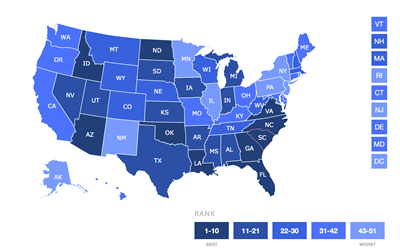Associated Builders and Contractors’ new “Building America: The Merit Shop Scorecard” reviews and grades state-specific information significant to the success of commercial and industrial construction stakeholders. The meritshopscorecard.org site identifies states that have created an environment where merit shop contractors are well positioned plus those where strategic improvements need to be made in order to create a friendly business climate.
| CONSTRUCTION BUSINESS CLIMATE ON THE MERITS |
|
|
| MAP: Associated Builders & Contractors |
The Merit Shop Scorecard grades states on project labor agreement (PLA), prevailing wage and right-to-work policies; construction job growth rate; commitment to developing a well-trained workforce; level of flexibility in career and technical education curricula; and, use of public-private partnerships (P3s).
“The Merit Shop Scorecard will be a useful tool for lawmakers and industry stakeholders to explain how state policies affect the ability of contractors to conduct business and expand their operations,” says ABC Director of Labor and Federal Procurement Ben Brubeck. “[It] highlights high-performing states that have enacted policies opposing anti-competitive schemes and restrictive, cost-inflating mandates while embracing fairness in the workplace. It also identifies low-performing states that have failed to foster environments where businesses can thrive, invest and create construction jobs in local communities.”
The merit shop philosophy, Brubeck adds, holds that people and companies succeed based on free enterprise principles within the free market system, which is characterized by open and fair competition and diverse participants. Those who adhere to this philosophy believe employees and employers have the right to determine wages and working conditions through either individual or collective bargaining, as they choose, within the boundaries of the law. They oppose violence, coercion, intimidation and the denial of the rights of employees and employers. Furthermore, they believe it is incumbent upon all branches of government to be responsible stewards of taxpayer dollars and that government should award contracts based solely on merit to the lowest responsible bidder, regardless of labor affiliation.
Top ranked states such as Arizona, Louisiana and Virginia all received high-performing grades for enacting PLA, prevailing wage and right-to-work policies that favor free enterprise. Conversely, low performing states such as New Mexico, Alaska and New York received poor overall rankings by earning D or F grades for their policies on PLAs, prevailing wage and right-to-work legislation and other measurable categories.
The Merit Shop Scorecard was developed with input from ABC chapters as well as industry stakeholders across the country. The website provides criteria and definitions for the seven key issues on which state policies and records are evaluated: PLAs, P3s, prevailing wage, right to work, workforce development, career and technical education, and job growth rate. The meritshopscorecard.org site will be updated monthly with exclusive state construction unemployment rate estimates from economist Bernard Markstein, Ph.D.
